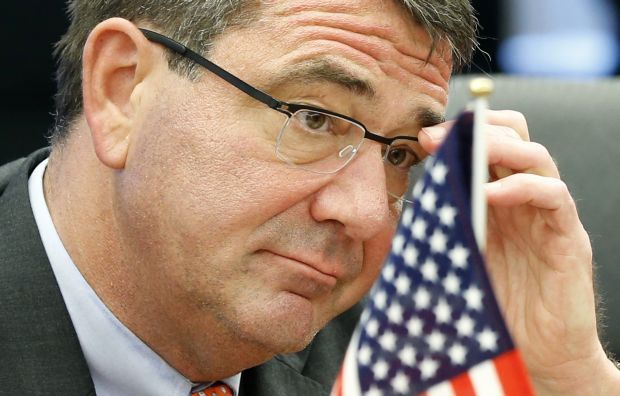
Speaking at the World Economic Forum in Davos, Switzerland, Carter said the U.S.-led coalition of nations will focus on Iraq and Syria, even as it watches Islamic State, also known as ISIL or Daesh, try to spread its influence around the world, The Wall Street Journal wrote.
"This is the parent tumor of ISIL and we need to defeat it there," Carter said. "And we need to combat it elsewhere to where it has spread."
He said the operational plan of the coalition against Islamic State is to retake the Iraqi city of Mosul and defeat it in its self-declared capital of Raqqa, Syria.
"You should think of an arrow going to Mosul, capturing Mosul and an arrow going to Raqqa, Syria, and capturing Raqqa, the so-called capital," Carter said.
He met in Paris this week with key defense ministers and will meet in February in Brussels with the full coalition against Islamic State.
Iraqi Prime Minister Haider al-Abadi said Friday at Davos that his military is capable of retaking Mosul.
Carter praised the Iraqis for their success in Ramadi, and said the victory there would give Abadi and the Iraqi forces momentum.
"Ramadi gives him opportunity to do more," Carter said. "Success gives opportunity for more success."
Still, he added, to sustain success in Iraq, people must be lured back to Ramadi to help rebuild the city.
"People have to be brought back, homes have to be put back together," Carter said. "This is where I am going to ask others to make contributions."
In a panel session, Carter was joined by Jens Stoltenberg, the secretary-general of the North Atlantic Treaty Organization, and Afghan President Ashraf Ghani.
Stoltenberg said new forms of warfare, such as cyberattacks and hybrid threats including irregular warfare, allow people to wage war "in a time of peace." More people, he said are living in areas with frozen conflicts.
"Before it was peace or war. Now more and more countries are living in a state which is in between," Stoltenberg said. "That is about the blurring line between war and peace."
Stoltenberg said the alliance needs to adapt to new forms of warfare to improve NATO's ability to understand when a member might be under threat from an outside force.
"We have to improve our intelligence…to define exactly when we are under attack," Stoltenberg said.

